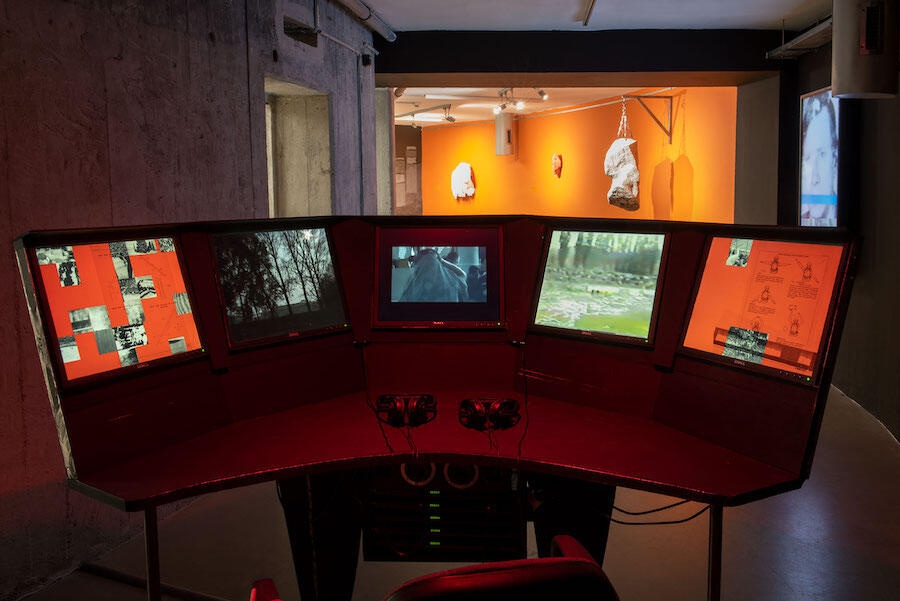03 October 2022 Ranging from Marcin Dudek's surveillance installation to Mary Lucier's pioneering works with video, artists at this year's fair look at our relationships with technology in the modern era.
Taking place 12-16 October, Frieze London and Masters will feature many presentations which spotlight technology in the modern era and how it manifests in our daily lives.
Marcin Dudek explores the politics of identity, space and surveillance culture. His installation Control Room recreates the security surveillance hub of a stadium, using salvaged materials and archive footage of crowd violence to conflate ideas of hooliganism, memory and the architecture of social experience. (Edel Assanti, London, Frieze London, Focus, Stand H2).
 Marcin Dudek, Control Room, 2019, Video installation, 5 computer monitors, 5 DVD players, 2 speakers, 2 headphone sets, aluminium, wood, acrylic paint, rubber, fabric, leather, plastic, transparent film, 150 x 150 x 150cm.
Marcin Dudek, Control Room, 2019, Video installation, 5 computer monitors, 5 DVD players, 2 speakers, 2 headphone sets, aluminium, wood, acrylic paint, rubber, fabric, leather, plastic, transparent film, 150 x 150 x 150cm.
A highlight of the Indra's Net section, Oscar Santillán investigates Artificial Intelligence, terraforming, cybernetics, and science fiction. His work Forecast uses the colonial form of a Wardian case to encase a hidden garden, which is illuminated through screens displaying apocalyptic films. Debates on ecology and technology are highlighted in this sculpture, as well as in the artist's "Antimundo" series of paintings and light boxes (Copperfield, London, Frieze London, Indra's Net, Frieze London, Stand IN7).
Shigeko Kubota (1937-2015) pioneered the artistic use of video since the late 1960s and was among the first to discover the affective potential of the combination of sculptural forms and video imagery; integrating video in sculpture became Kubota's artistic language (Galerie Hubert Winter, Vienna, Frieze London, Stand G18).
Hélène Fauquet's work elaborates on questioning the materiality and displacement of the images that surround us and the possibility of shifting perspectives (Édouard Montassut, Paris, Frieze London, Stand H20).
In his 'Tightrope' series, Elias Sime deftly weaves, layers and assembles repurposed materials-computer keyboards, motherboards, and electrical wires-into abstract compositions that suggest topography, figuration, and sublime color fields (James Cohan, New York, Frieze London, Stand B10).
Peggy Ahwesh's pigment prints, video sculpture, and 360 degree touchscreen videos on view address issues of displacement, cultural identity, world events as portrayed by news media and the role played by our hyper-connected society (Microscope, New York, Frieze London, Stand H4).
The layers in Agnieszka Polska's videos and prints depict motifs related to technological phenomena, human and non-human imageries, micro and macro universes (Union Pacific, London, Frieze London, Stand H17).
Mary Lucier is a video art pioneer highly regarded since the 1970s for her multi-channel video installations. In 1972-73, she produced several live performances with the feminist video collective Red White Yellow and Black (along with Shigeko Kubota, Cecilia Sandoval and Charlotte Warren) at The Kitchen (Cristin Tierney Gallery, New York, Frieze Masters, Stand S7).

